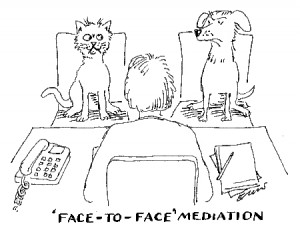An Easier Way To Win Your Small Claims Case
In all my time learning about and working in the legal field, I’ve met numerous people from almost every level of the justice system. From jurors, to plaintiffs, district attorneys, even judges, all of these groups have imparted on to me valuable bits of knowledge that I continue to reflect on and hold dear to this day. Though of all the kernels of wisdom I’ve taken from each of them, only one tidbit have I found to be so constant among each that it must be considered a universal truth. This truth is: lawsuits suck. Also, tax laws are so needlessly long, confusing, and esoteric that they might as well be written in Klingon.
Getting back to my original point of lawsuits sucking, what I mean by this is that no one in the legal field likes to deal with them. Sure, for some lawyers standing up at trial for their client can be fun, but the arduous ordeal of filing, researching, and following through on a lawsuit from beginning to end is full of moments where one’s thoughts flow to how awesome it would have been to be a rock star or video game designer. Oh wait, scratch that last one. To those unfortunate enough to be dragged into a lawsuit, ever wonder why the judges always seem to be so angry and impatient? It’s because the vast majority of civil lawsuits come in the form of that last link I posted.
The immaturity and patience-testing minutiae-driven arguments are only more plentiful and aggravating when one steps into small claims court. Here, the judges are more Judge Judy than Justice Marshall. Also, none of the litigants ever seem happy to be there. Why? Because small claims courts in most jurisdictions can only handle disputes up to $5,000 or $7,500 and who in their right minds wants to fight over an amount small enough to be handled without a court order (let alone be the judge to preside over such a fight)? Patience is short when one is forced into small claims court, but there is another way to settle your dispute without the need for a judge. That way is mediation.
 Mediation may sound very touchy-feely, but it’s actually a very effective way to handle lawsuits, especially small claim disputes. Many small claims courts have released reports stating that upwards of 90 percent of disputes that were mediated instead of presented to the court ended in mutually satisfying settlements. Most courts in the country offer free mediation services for litigants to utilize, and some even mandate parties to try and mediate their case before they can battle it out in court.
Mediation may sound very touchy-feely, but it’s actually a very effective way to handle lawsuits, especially small claim disputes. Many small claims courts have released reports stating that upwards of 90 percent of disputes that were mediated instead of presented to the court ended in mutually satisfying settlements. Most courts in the country offer free mediation services for litigants to utilize, and some even mandate parties to try and mediate their case before they can battle it out in court.
The process of legal mediation is simple. Parties who agree to mediate will sit down in a conference room with a mediator. The mediator is a neutral third-party similar to a judge. However, mediators differ in that they aren’t there to hear cases and pass judgments on who’s right or wrong. Rather a mediator’s role is to help facilitate conversation between the arguing parties and help them come to a settlement that’s fair and satisfying to both parties. Mediation also offers a number of distinct advantages that a court judgment does not:
1) Controlling Uncertainty
Judges and juries are fickle and the way a case can turn out sometimes doesn’t go as planned – just ask any attorney. However, when it comes to small claims disputes, this is especially true since it’s incumbent upon the party themselves to make a compelling case, as small claims courts generally don’t allow attorney representation. Mediation allows parties to control how their case turns out by allowing them to draft the settlement themselves with the help of the mediator, thereby eliminating that uncertainty.
2) Faster Binding Decisions
For those too impatient or anxious to wait for how a judge will decide on their case, which can take upward of 3 weeks, mediation settlements are instant since the parties create the settlement agreement. Once made, the judge can then certify the agreement and make it as binding as any court judgment.
3) No Judgments on Public Record
This is especially good for those who looking to keep their private disputes privates. Mediation agreements are binding on the parties, but unlike court judgments, they don’t go on public records in most jurisdictions. That means creditors, lenders, and people in general can’t discover your legal past.
Best of all, mediation is free and there are no adverse consequences in trying. If you don’t come to a settlement, you can just take your dispute to court and have the judge decide. Also, from a practical perspective, getting your argument out in mediation also gives you a chance to clarify what you’re going to say to the judge if you can’t reach a settlement and need to go before the court. Judges are also generally more pleasant to parties that he or she knows tries to work things out beforehand. Because the last thing you want is an angry small claims judge.


Comments
What if the whole purpose of the small claims lawsuit is to get the matter of the lwsuit known to the public. That exposure is more important than winning. That the purpose of the lawsuit is not just to win, but to get the media to report on that win so that it will put other companies on notice that they can be sued for the same reasons by other individuals?